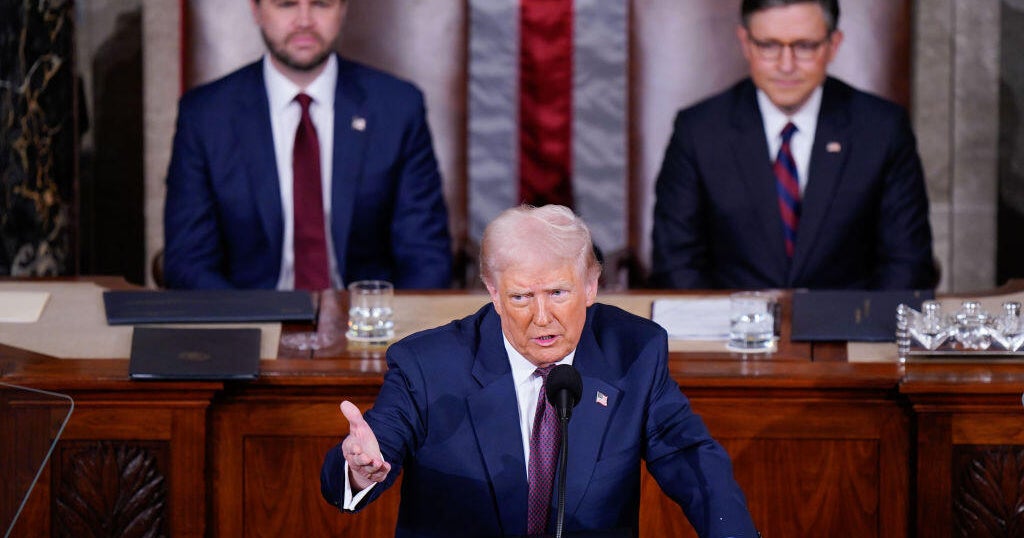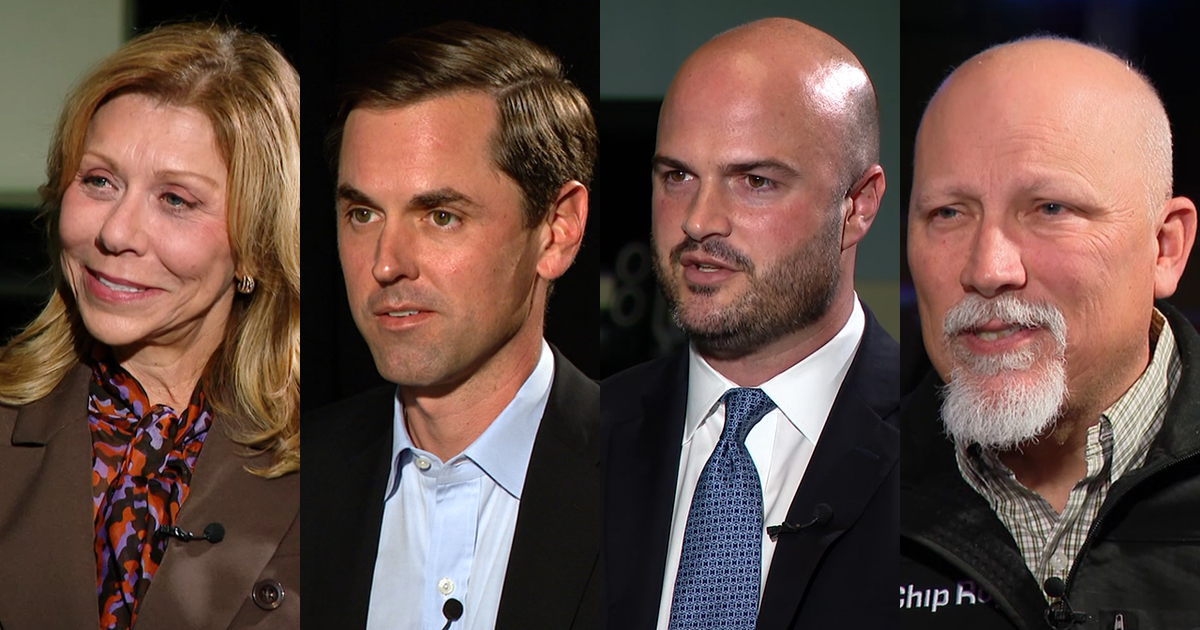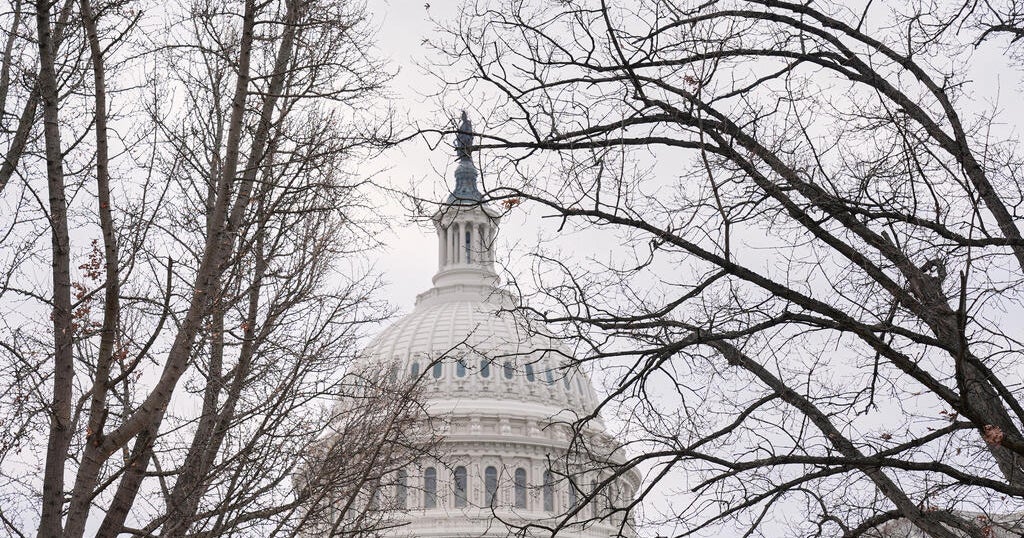Sen. Tim Kaine says Trump and GOP's "violent" rhetoric about government after Mar-a-Lago search raises risk of "political mayhem" — "The Takeout"
In the aftermath of the FBI raid on former President Trump's Florida residence, Trump and like-minded Republicans have resorted to "extreme and violent" rhetoric or assertions about government motives that increase the risk of political mayhem, says Sen. Tim Kaine, Democrat of Virginia.
Kaine noted Trump and sympathetic conservatives have baselessly suggested FBI agents planted evidence during their search of Trump's Mar-a-Lago residence. Trump and Republicans have called the search an "invasion" and illegitimate — prompting calls from some to disband or "defund" the FBI — currently led by Trump-appointed Director Chris Wray.
"When you see Donald Trump suggesting that, that tells you he's worried about something that they'll find," Kaine told CBS News chief Washington correspondent Major Garrett on this week's episode of The Takeout. "He's trying to lay the groundwork for claiming it wasn't really his."
The interview was conducted Aug. 10, one day before a Trump protester who was in Washington, D.C., on Jan. 6, 2021 during the Capitol riot, attempted to infiltrate an FBI field office in Cincinnati, leading to an armed standoff and the suspect's death in a shootout with authorities.
Kaine said Trump remains "innocent until proven guilty" in any probe into his handling of classified documents.
Attorney General Merrick Garland has moved to release the search warrant and written summary of materials the FBI removed under the search warrant's authorities. Kaine noted Trump, who first disclosed the raid, could have done so himself.
"Thus far, he's not doing that. Instead, he's whining about the FBI persecuting him," Kaine said.
Asked about the sizable contingent of Trump supporters who rallied near Mar-a-Lago and complained about the lack of focus on President Biden's son, Hunter Biden, Kaine noted that the Justice Department has an active investigation into Hunter Biden's financial dealings.
"If you're a powerful person, if you're related to a powerful person, you're subject to the same laws that everybody is," he said. "And Democrats don't question it. And it's not all Republicans who question it either, but why Donald Trump and his acolytes believe he should be above the law is very, very troubling."
In political matters, Kaine said he would support Mr. Biden if he ran for re-election but noted that uncertainty about the president's plans has created "angst" within the party. He said if Mr. Biden were to defer a run for re-election Vice President Kamala Harris would be the "front-runner" but not heir apparent.
But he said he highly doubted his 2016 running mate Hillary Clinton would run if Mr. Biden did not in 2024.
"I don't see that right now," he said.
Highlights from this week's episode:
- Economic impact of the Inflation Reduction Act: "This bill is not a magic wand that you waive it, and the inflation rate automatically goes down. But there are elements to this bill that will be really, really good on people's pocketbooks. Give you an example: Monthly costs for insulin for the millions of seniors on Medicare who use insulin will be capped at $35. That is a huge savings for people. Your out-of-pocket costs, if you're on Medicare for prescription drugs, will be capped at $2,000 annually. That's a huge saving for millions of people whose out-of-pocket costs now exceed that. And within a few years, we'll start negotiating pricing for prescription drugs under the Medicare program, and that will also bring prices down. So, we also extend premium support for people buying health insurance on the exchanges. … When you make health insurance less expensive, more people get health insurance. So, in some key areas, energy cost, prescription drugs, health insurance costs, yes, we're bringing prices down. And then, the fact that the bill was a deficit reducer is also going to have some significant effect over the long-term in helping us deal with inflation."
- Renewable energy impact of IRA: "Since the United States had never really done offshore wind, none of the components were being manufactured in the United States. The first offshore wind component manufacturing now is going to be done in Portsmouth, Virginia. We're going to bring energy costs down, but we're also going to create a new manufacturing industry in Virginia and in the United States that will, that will employ a lot of people. And I'm very excited about that."
- Killing al Qaeda leader al-Zawahiri: "The al-Zawahiri attack fits within what Congress was intending when it acted in September of 2001. But the problem is the [9/11] authorization is just too open ended. So, I'm engaged right now in three different efforts. One – and we may get a vote on this in September or October – repeal the Iraq War authorizations. … Iraq is now a security partner of the United States, not an enemy. We should repeal the 9/11 authorizations. Secondly, redraft the 2001 authorization to narrow it down to terrorist groups like al Qaeda and not have it so open ended in scope, in time and geography, and who we're authorized to take military action against. … The third thing I'm trying to do is rewrite the War Powers Act of 1974, because that act was well-intended, but it had some problems with it that have caused no president to fully follow it and no Congress to fully follow it of either party.
- Senate vote to codify same-sex marriage: "I think we're getting close to it. As you know, every Democrat will vote to essentially provide this federal guarantee that you can marry whom you choose, codifying the Obergefell decision. Every Democrat will vote for it. And we have some Republicans who will, too. About four or five Republicans have declared they would vote to do that. But we need 10. So, will we get 10? Senator Schumer has made it pretty plain that we're going to call this up. But he tends to time things. I don't want to call it up prematurely if there's votes out there on the table that we can still get. So, I know he's working with a number of senators to try to determine when the best timing is. I do think it would be an enormously illustrative vote, even if we fall short. So, my inclination would be, we should have that vote even if we fall short, but we shouldn't have it prematurely if there's still votes out on the table that we can coax to do the right thing."
Executive producer: Arden Farhi
Producers: Jamie Benson, Jacob Rosen, Sara Cook and Eleanor Watson
CBSN Production: Eric Soussanin
Show email: TakeoutPodcast@cbsnews.com
Twitter: @TakeoutPodcast
Instagram: @TakeoutPodcast
Facebook: Facebook.com/TakeoutPodcast



